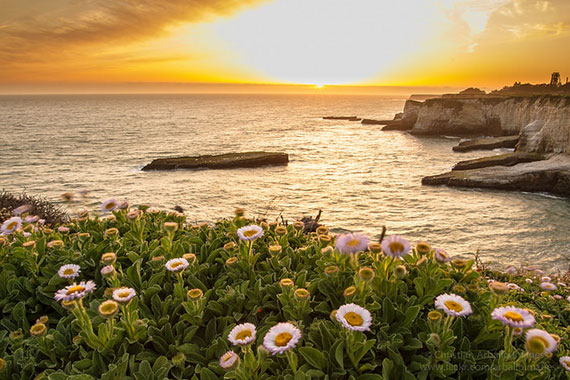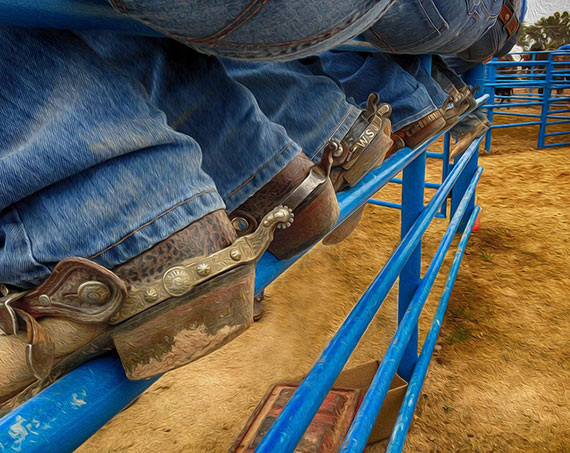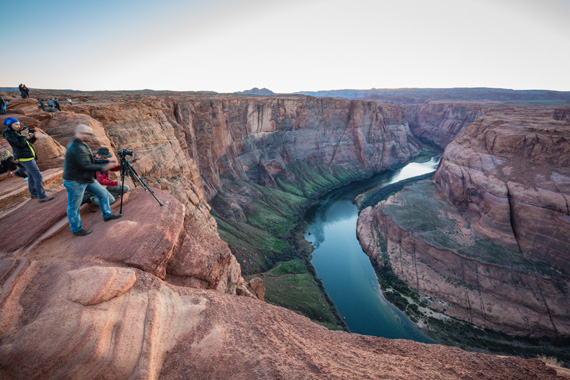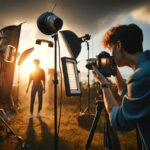1. Expensive gear is NOT a requirement. Start your photography journey with the equipment you can afford and don’t be tempted to spend huge money! The range of point and shoot cameras now available at very reasonable prices are really all you need to start. If you find that you want to go further with photography – then buy equipment as you can afford to advance.
2. Stand firm. Tripods, or monopods are a valuable and often underused accessory, regardless of the type of camera you have. They help you to stay still to take a photograph in tricky light and slow shutter speeds. They can mean the difference between a great day shooting and a mediocre one!
If you do suffer with a shake then definitely try using one. There are other ways to keep a camera still – try a small “bean bag” and rest the camera on it. Hold the camera against a steady door frame or handy pole – assuming there’s one about! With a bit of ingenuity you can usually find something to help keep a steady camera.
3. Keep your camera with you all the time. I’m always saying this (I may not obey my own “rules” sometimes and usually regret it!), picture opportunities are everywhere if you learn to see them. IF you don’t have a camera with you, make a mental note (or a written one is better!) and return to the scene in the hope that the picture is “still there”…
4. Make shooting lists. There are MANY opportunities for pictures. Ok – I’ve said that before, but it’s also a great thing to make a list of shots you would like to get at some time. Maybe make a To Do list of different types of picture you have seen and would like to try to replicate. Better still take your own slant on a topic and set a goal to make the shot.
5. Don’t overlook “the ordinary” for photography. Some of my good pictures have been taken in my garden or very locally to me. Keep your eyes open for odd shapes in things you usually pass by. There is a wealth of material in your own home and garden areas! This is where learning to SEE the pictures is “required”! A different light, a strange shadow….Simple CAN be excellent!
6. Learning is fun. The topic of photography is massive! Inspiration and opportunity is everywhere and it just requires this “Taking Time to See” and you will be surprised what you could discover. Take time to learn the ins and outs of photography as far as you want to go. READ THE INSTRUCTION BOOK to all your gear. You might be surprised how much easier it is to use the equipment once that’s done!

Photo by Christian Arballo; ISO 200, f/22.0, .4-second exposure.
One basic tip – Just get out there and use the camera!
7. Learn Free! There is so much free information, free software and tools out there on the net. Use them – you do NOT need to spend money to start, apart from the camera and other hardware. You will need a computer but most people / families have them now. Just add free tools and go for it.
8. Test various camera settings. Just read the instruction book and learn what the dials and buttons do. It helps! Many of the point and shoot cameras are pretty sophisticated – much more so than when we started back in the 70s and 80s!! (Oh dear I can hear the violins and mewling starting now! It’s such a shame!) Point and shoot was just that! No (or very few) settings and you got what results you could. Trouble is you also had to pay for the mistakes to be printed! Digital allows a lot more freedom. Play and experiment!
9. Learn the basic rules. Learn what makes a great picture! What the camera sees and records in a picture is really quite different to what we see with our eyes! A few tips from experienced photographers can mean a lot to help your photographic experiences. Online there are innumerable forums and websites that give a wealth of free information. Look for articles on composition and technique; take note of what the “rules” of photography are as suggested by other photographers in the business. Then you can go and break the rules to make your own stamp on your photography….

Photo by Katie Moore; ISO 50, f/2.4, 1/359-second exposure.
10. Use the camera. A picture a day. Try it and see how you get on. Make a list of weekly assignments that you set yourself. There are many forums that have Weekly Assignment topics. Try them and keep pushing yourself to do more. Practice, practice works wonders! Keep that camera WITH you!
About the Author:
My name is Mike Finding and I am a very keen and active photographer (photographytipsandhints). I have been using a camera for 40+ years and have learnt so much from the earlier days of darkroom processing and I now love the digital format.
Like This Article?
Don't Miss The Next One!
Join over 100,000 photographers of all experience levels who receive our free photography tips and articles to stay current:






Oh, sorry…just saw it above at the end of the article.
Mike Finding…what is your web site?
Re. # 7 Darktable http://www.darktable.org/ will do everything Lighthouse will & at no cost.
Great tips…but I find it extremely unsettling that the first image seen is that of somebody (and apparently the shooter as well) on railroad tracks! This is not exactly the message to be delivering to the “beginner” with all the risks involved…not to mention the laws prohibiting it.
Many thanks to you all for your comments on my article content…. I totally missed replying here, my BAD…sorry for that oversight.
Thank you for the +1 on 1 & 10 Andrys!
LOVE your “Ladies View” photo Rob!!
Nothing wrong with frugal – especially these days, Brittany Nicole
Best to you all and many thanks PictureCorrect for picking up my article!
Bye for now
Mike
This is really insightful and gives hope to the frugal side of society.
Great list. Completely agree with number 10. I started doing exactly that over 5 years ago and it rapidly improved my photography.
+1 for both tip #1 and tip #10!!
Often beginners think that the gear makes the photos. It helps you but it doesn’t do everything.
And don’t forget to shoot. Keep shooting!!!